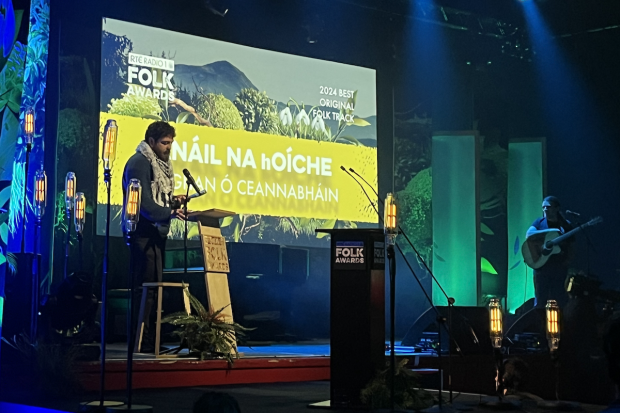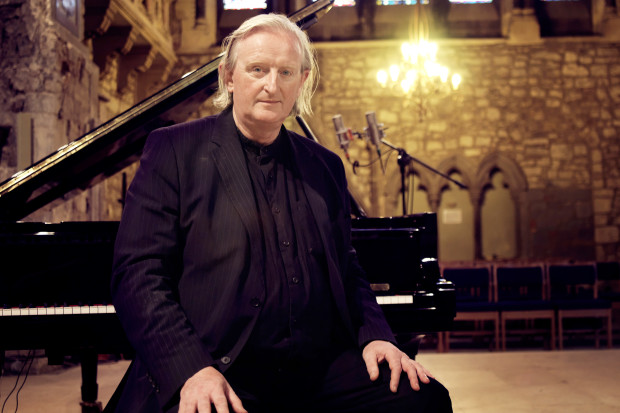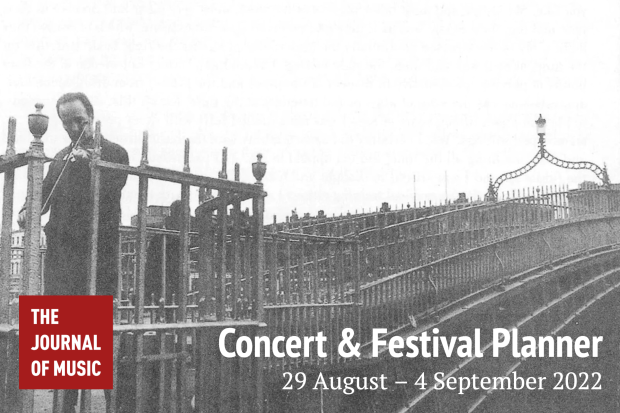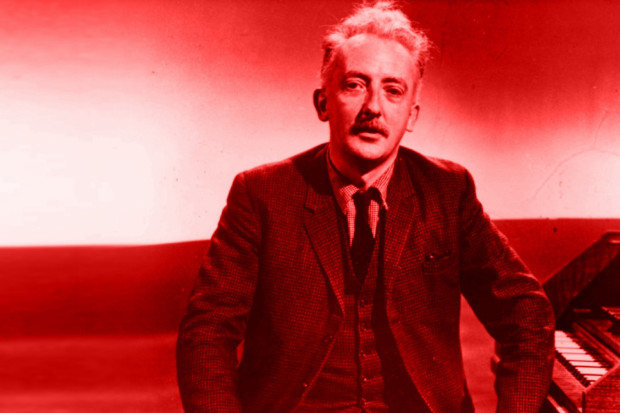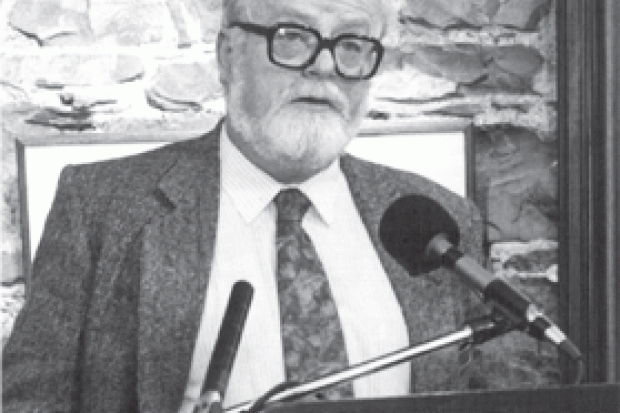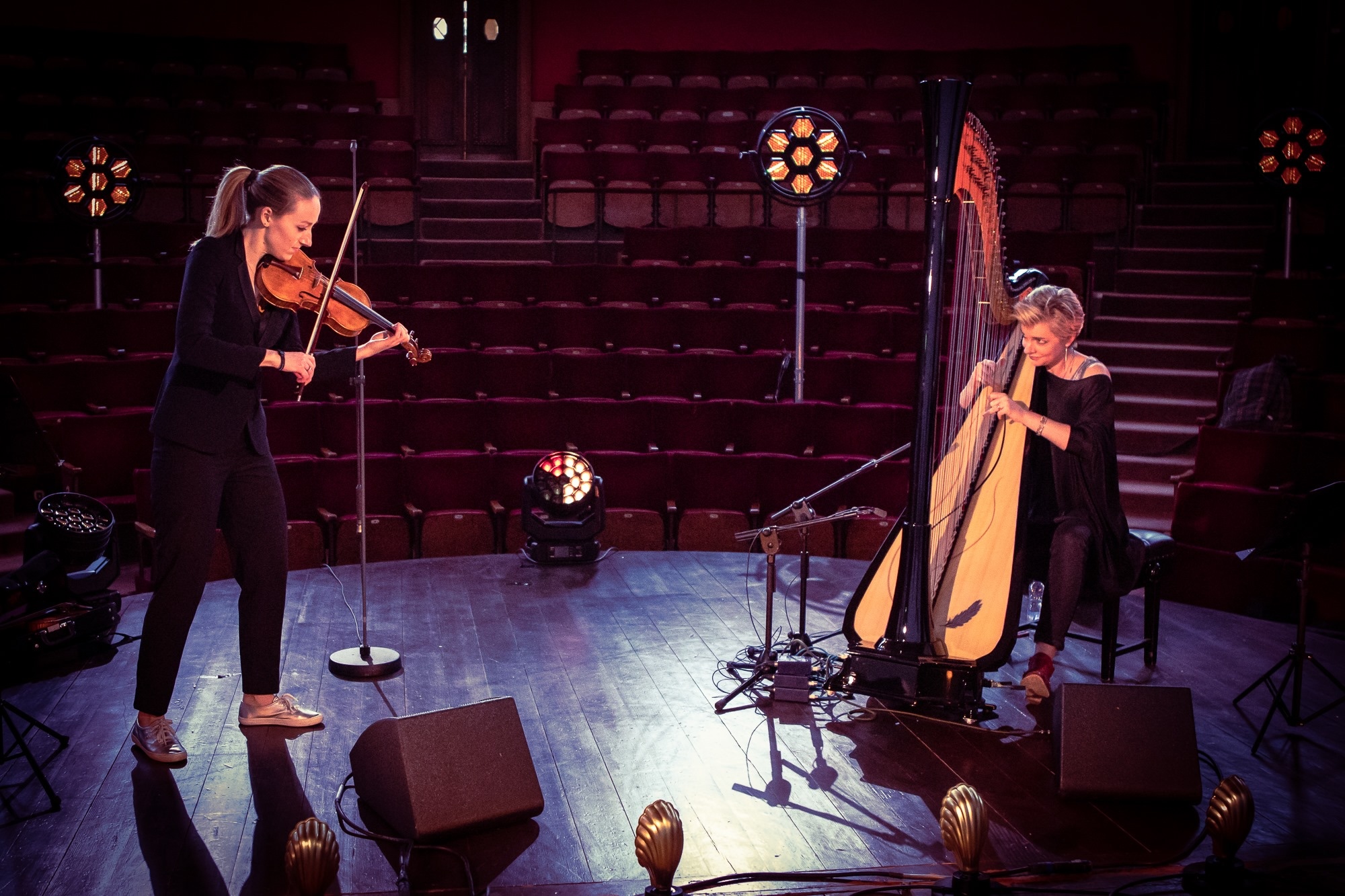
Aoife Ní Bhriain and Catrin Finch (Photo: Other Voices)
Trading Irish and Welsh Tunes
Double You is the first collaborative album between the Irish fiddle player and violinist Aoife Ní Bhriain and Welsh harpist Catrin Finch, a partnership that began with an Other Voices concert in Wales in 2021. When I last heard Ní Bhriain play live, it was in a hypnotic performance of the sarabande from Bach’s D minor partita fused with work by Tommie Potts, a blend so effortless that you couldn’t hear the shifts between the works. (Her work around Potts for the Irish Traditional Music Archive and elsewhere is superb.) And Finch’s other work includes frequent collaborations with the Senegalese Kora player Seckou Keita – often groove-driven, complex and compelling – as well as a successful recording of the Goldberg Variations. In the light of that work, a collaboration between Finch and Ní Bhriain has the potential to be exciting.
There are nine tracks on the album, each a single word starting – per the album title – with W: ‘Whisper’, ‘Why’, ‘Wonder’, ‘Wings’, ‘Wandering’, ‘Waves’, ‘Woven’, ‘Waggle’, and ‘Wish’. Ní Bhriain and Finch each have feet in the classical and traditional worlds, and the melodies on the album draw from these, incorporating traditional tunes from Ireland, Wales, and further afield, as well as classical melodies, but with the duo building their own light contemporary folk pieces around them.
The album’s opening statement, ‘Whispers’, sees the duo take a phrase through a number of iterations, starting with plucked fiddle and harp accents before the prominence is swapped, with harp harmonics and fiddle backing it up. The music is brightened through a bouncy major-key section before closing with a contemplative coda.
The duo takes free inspiration from their broad musical backgrounds throughout the album, but at its most traditional the album works best. The second track, ‘Why’, is dedicated to the memory of Finch’s friend Pastelle LeBlanc, and incorporates tunes from Breton and Prince Edward Island, while ‘Waves’, the sixth, uses the hornpipe ‘Galway Bay’ and the Welsh tune ‘Cwyn Mam yng Nghyfraith’ (‘My Mother-in-Law’s Lament’) as its starting points, with a sprinkling of 5/4 bars adding a little light rhythmic disorientation.
Ambient and delicate
‘Wings’, from Finch’s own tune ‘Listen to the Grass Grow’, is so gentle it borders on ambient, delicate harp arpeggios with a serene violin floating over the top. There’s a touch of Ennio Morricone in the next tune, ‘Wandering’, as its melody climbs to the clear heights of the fiddle’s timbre and Ní Bhriain indulges in her most classical playing on the album. ‘Waggle’ incorporates a manouche jazz influence, with a quicker tempo and a darker tone than the rest of the recording. It also features the most openly virtuosic playing on the album. But there’s a sweetness or a niceness of sound even in these tracks that the album never really tries to get away from, and that makes the central tracks blur somewhat.
So moments of timbral exploration and virtuosity are to Double You’s strength. Two tracks stand out more strongly: first, ‘Why’, clearly an important personal project, with a beautiful structure building from fluttering ghosts of notes on the fiddle over a round bassy harp building to a defiant performance of the tunes at the centre – ‘Personne n’en est la cause’ (‘No one is to blame’) and ‘La Reel à Sarazine’. It ends with the question mark implied by the title. Second, the understated closing track, ‘Wish’. The latter returns to a contemplative mode, beginning with ‘Tabhair Dom Do Lámh’ plucked simply on the fiddle followed by the harp playing the same tune in broken octaves. They grow to incorporate the Welsh tune ‘The Ash Grove’, eventually combining the two in a simple but effective counterpoint, a nice symbolic way to show the album’s joining of music and musicians from Ireland and Wales.
There are other influences scattered through the album, including classical and pop-contemporary. The seventh track, ‘Woven’, uses the melody of Pietro Locatelli’s twenty-first capriccio from the set of twenty-four, but Ní Bhriain’s playing on the Norwegian hardanger make it convincing as a traditional tune. The two trade the melody back and forth, even combining sections of the piece in pretty counterpoint. And ‘Wonder’, the third track, is an improvisation around a Bach prelude concluding with Mendelssohn. The bariolage style of the prelude is placed over a broader chord loop in the vein of Ludovico Einaudi, making a sort of supra-harmony with the prelude sitting on top of it.
I invoke Einaudi’s name above with caution, knowing the (honestly often disproportionate) reaction he evokes in much of the musical world – and to be clear, I don’t see him as a major stylistic influence here. Ní Bhriain and Finch are skilled performers, so Double You has a technical deftness that his music lacks. It’s an album that is well produced and sometimes impressive, but always safe, and a collaboration between these artists feels as if it could have been more adventurous than this first release.
Double You is available to purchase from www.catrinfinch.com.
Subscribe to our newsletter.
Published on 16 November 2023
Brendan Finan is a teacher and writer. Visit www.brendanfinan.net.










